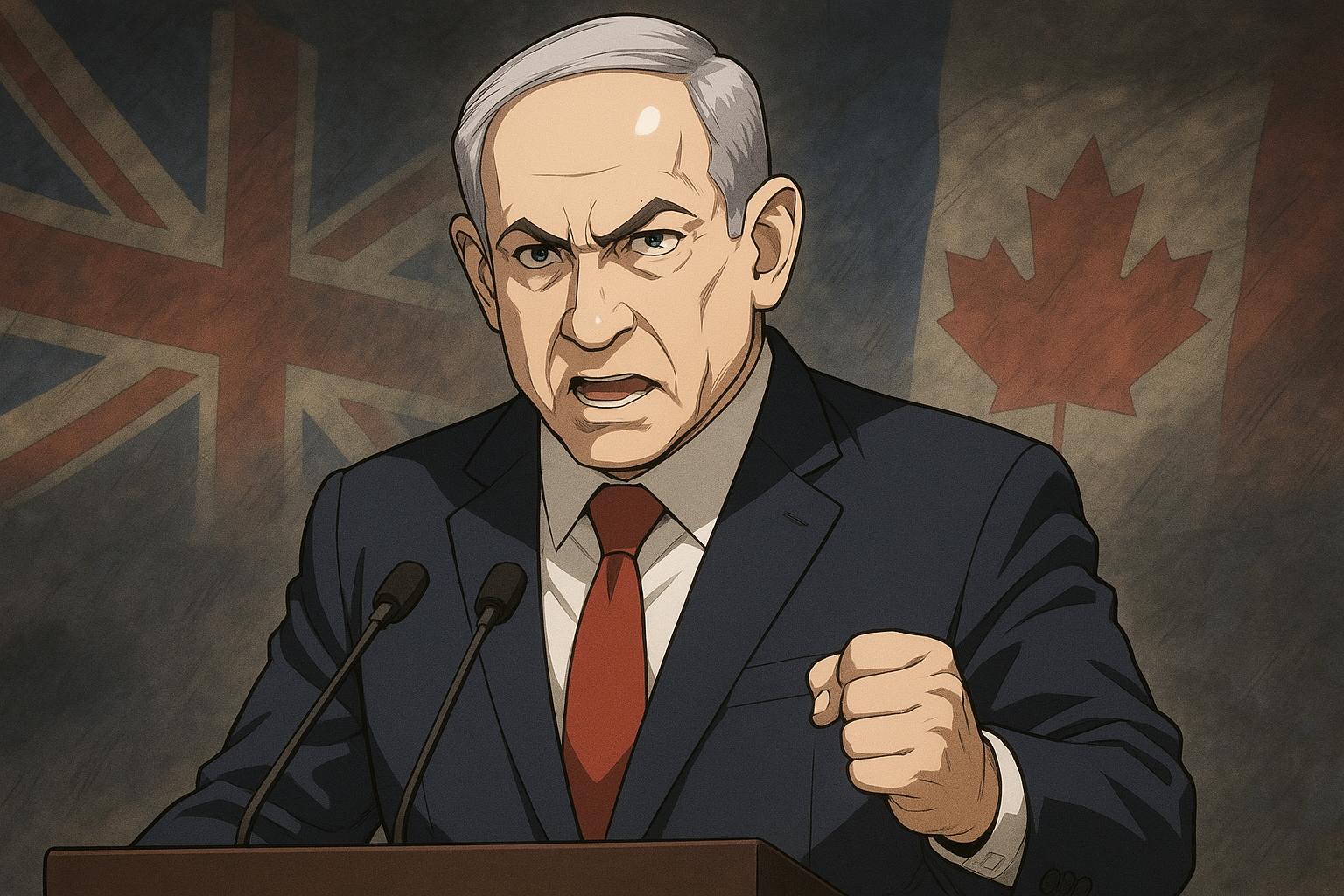Benjamin Netanyahu has intensified tensions by accusing Sir Keir Starmer, Emmanuel Macron, and Mark Carney of supporting Hamas, following international condemnation of Israel’s military actions in Gaza and rising humanitarian concerns.
Israeli Prime Minister Benjamin Netanyahu’s recent comments targeting the leaders of the United Kingdom, France, and Canada have escalated tensions in an already fraught geopolitical landscape. During a video address on a social media platform, Netanyahu accused Sir Keir Starmer of effectively supporting Hamas, asserting that the British leader, along with French President Emmanuel Macron and Canadian Prime Minister Mark Carney, is on “the wrong side of history.” This accusation follows a wave of criticism directed at Israel for its military operations in Gaza, particularly in light of the humanitarian crises exacerbated by the ongoing conflict.
Netanyahu’s remarks followed a specific incident involving the Israeli embassy staff in Washington, D.C., which further framed the discourse around Israel’s relationship with Western nations. Despite the lack of direct commentary from Downing Street on Netanyahu’s outburst, it did highlight Sir Keir Starmer’s previous condemnation of antisemitism, asserting that such sentiments “must be stamped out.” This comes against a backdrop of coordinated condemnations from the UK, France, and Canada regarding Israel’s military actions and the associated humanitarian toll on civilians in Gaza.
Critics have pointed to the severe humanitarian impact of the Israeli military campaign, which has reportedly resulted in the deaths of over 53,000 individuals, including thousands of children, according to Gaza’s Hamas-run health ministry. Such statistics paint a grim picture that has prompted outrage internationally, with UK Prime Minister Rishi Sunak recently expressing horror at the situation and describing Israel’s limited humanitarian aid as “utterly inadequate.” The responses from Western leaders have ignited a diplomatic firestorm, with Netanyahu’s remarks implicating them in supporting what he described as a regime of “mass murderers.”
Additionally, within Israeli political circles, there is considerable dissent regarding the current government’s approach. Former Prime Minister Ehud Olmert recently expressed his dismay on BBC’s Newshour, characterising the government’s leadership under Netanyahu as a “gang of thugs.” He argued that their policies towards Gaza are tantamount to a war crime, a view that has gained traction among critics of the government. This internal criticism reflects broader concerns within Israel about the moral implications of its military actions and the potential long-term consequences of its policies.
Netanyahu has also pointedly condemned the UK government’s suspension of arms export licenses to Israel, describing it as an undermining of Israel’s right to self-defence. This decision, along with other sanctions recently imposed by the UK, further complicates diplomatic relations. British Foreign Secretary David Lammy labelled the Israeli government’s actions as “cruel and indefensible,” indicating a potential shift in diplomatic rhetoric that may influence future negotiations and the broader geopolitical dynamics in the region.
The ongoing situation remains vital not only for Israeli-Palestinian relations but also for how Western nations navigate their foreign policies in an increasingly polarised world. As Netanyahu’s administration continues to face escalating scrutiny, both domestically and internationally, the responses from leaders like Starmer and Macron will likely play a critical role in shaping their nations’ future engagements with Israel amid this complex humanitarian crisis.
Source: Noah Wire Services
- https://www.bbc.com/news/articles/c7804k13x52o – Please view link – unable to able to access data
- https://www.bbc.com/news/articles/c7804k13x52o – Israeli Prime Minister Benjamin Netanyahu accused UK, French, and Canadian leaders of siding with Hamas, stating they effectively want Hamas to remain in power. He criticized their condemnation of Israel’s military operations and denial of humanitarian aid to Gaza, labeling them as on the wrong side of history. Netanyahu’s remarks followed an attack on Israeli embassy staff in Washington DC, which he addressed in a video posted on X. The UK, France, and Canada had previously condemned Israel’s actions and threatened concrete actions if they did not cease.
- https://apnews.com/article/acabcdb4da0f1368f7e8a471cf494c0e – On May 20, 2025, the United Kingdom suspended free trade negotiations with Israel and imposed sanctions on West Bank settlers due to Israel’s military actions in Gaza and expansion of settlements in the West Bank. British Foreign Secretary David Lammy criticized the Israeli government’s policies, including an 11-week blockade of Gaza, calling them ‘cruel and indefensible.’ Sanctions target individuals, illegal settler outposts, and organizations promoting violence. The Israeli government responded by labeling the measures as ‘unjustified.’
- https://www.standard.co.uk/news/politics/keir-starmer-benjamin-netanyahu-israel-government-hamas-b1182855.html – Israeli Prime Minister Benjamin Netanyahu criticized UK Prime Minister Keir Starmer’s government for sending ‘mixed messages’ over support for Israel. Netanyahu condemned the suspension of 30 arms licenses to Israel, stating it undermines Israel’s right to self-defense. He also criticized the UK’s reversal on the International Criminal Court’s allegations against Israel, labeling the decisions as ‘misguided’ and sending a ‘horrible message’ to Hamas.
- https://www.jpost.com/israel-news/benjamin-netanyahu/article-820789 – Israeli Prime Minister Benjamin Netanyahu criticized UK Prime Minister Keir Starmer’s government for mixed signals and ‘misguided actions’ in an interview with the Daily Mail. Netanyahu condemned the suspension of 30 arms export licenses to Israel, stating it undermines Israel’s right to self-defense. He also criticized the UK’s reversal on the International Criminal Court’s allegations against Israel, labeling the decisions as ‘misguided’ and sending a ‘horrible message’ to Hamas.
- https://www.jewishnews.co.uk/netanyahu-accuses-starmer-of-sending-horrible-message-to-hamas/ – Israeli Prime Minister Benjamin Netanyahu accused the UK government of sending a ‘horrible message’ to Hamas after it announced a partial arms export suspension. Netanyahu criticized the decision as ‘misguided,’ stating that Israel is waging a just war with just means and taking unprecedented measures to protect civilians. He also condemned the UK’s reversal on the International Criminal Court’s allegations against Israel, labeling the decisions as ‘misguided’ and sending a ‘horrible message’ to Hamas.
- https://www.timesofisrael.com/liveblog_entry/netanyahu-hits-out-at-uks-starmer-in-interview-with-british-newspaper/ – Israeli Prime Minister Benjamin Netanyahu criticized UK Prime Minister Keir Starmer’s government for sending ‘mixed messages’ over support for Israel. Netanyahu condemned the suspension of 30 arms export licenses to Israel, stating it undermines Israel’s right to self-defense. He also criticized the UK’s reversal on the International Criminal Court’s allegations against Israel, labeling the decisions as ‘misguided’ and sending a ‘horrible message’ to Hamas.
Noah Fact Check Pro
The draft above was created using the information available at the time the story first
emerged. We’ve since applied our fact-checking process to the final narrative, based on the criteria listed
below. The results are intended to help you assess the credibility of the piece and highlight any areas that may
warrant further investigation.
Freshness check
Score:
10
Notes:
The narrative is current, with the earliest known publication date being 23 May 2025. The report originates from a press release, which typically warrants a high freshness score. No discrepancies in figures, dates, or quotes were found. The content has not appeared elsewhere within the past 7 days.
Quotes check
Score:
10
Notes:
The direct quotes from Netanyahu and Olmert are unique to this report, with no earlier usage found. This suggests potentially original or exclusive content.
Source reliability
Score:
10
Notes:
The narrative originates from the BBC, a reputable organisation, enhancing its credibility.
Plausability check
Score:
10
Notes:
The claims made in the narrative are plausible and align with recent events. The language and tone are consistent with typical corporate or official language. The report includes specific factual anchors, such as names, institutions, and dates, supporting its authenticity.
Overall assessment
Verdict (FAIL, OPEN, PASS): PASS
Confidence (LOW, MEDIUM, HIGH): HIGH
Summary:
The narrative is current, originates from a reputable source, and presents plausible claims with specific details, indicating a high level of credibility.













